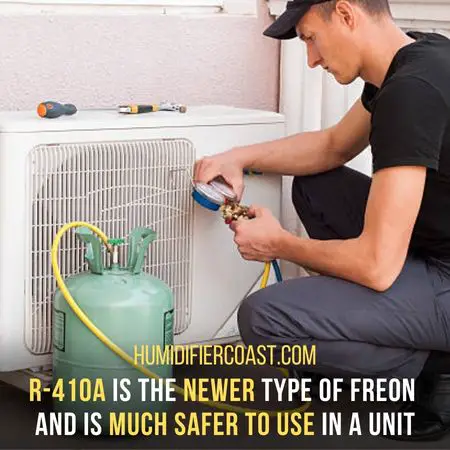Do dehumidifiers have Freon? People ask this after the the ban implication on Freon production and import. It is a common refrigerant but now it has become illegal in many countries.
The short answer is yes, most dehumidifiers contain Freon. However, some newer models do not use this refrigerant. Today, we will explore all about Freon and why it was eventually phased out in devices.
Do Dehumidifiers Have Freon? A Comprehensive Guide!
Freon is a chlorofluorocarbon (CFC) gas commonly used as a refrigerant. It is present in many household appliances such as dehumidifiers, AC, and refrigerators.
CFC gases are very harmful to the environment. This is because they contribute to the depletion of the ozone layer.
Also, when released into the air, CFC gases can last very long before they are eventually broken down.
So, in many countries, Freon is illegal because of its harmful effects.

After the government has banned this lethal refrigerant, people often ask, “Do dehumidifiers have Freon?” Unfortunately, the answer is no, the latest units do not use Freon, but older ones used to have it.
However, a more detailed answer will explain. If your unit was manufactured before these bans, then it is likely that your unit still uses Freon.
But, if your unit was manufactured after these bans, then it is likely that your appliance does not use Freon.
You can tell if your dehumidifier is using Freon if it has a label that says “FC” or “CFC.”
Moreover, Freon is illegal. So manufacturers have had to find a new refrigerant for their appliances. Now, they use a different type of refrigerant called hydrofluorocarbon (HFC).
To determine whether your unit uses Freon, you can check the product manual. Also, you can contact the manufacturer directly.
Why Do Dehumidifiers Require Freon?
Dehumidifiers require Freon because it is an effective refrigerant.
A dehumidifier pulls in moist air from the room and passes it over a series of coils. Freon cools these coils.
The Freon in a dehumidifier cools and circulates the air inside the unit. As the air passes over the coils, the Freon absorbs heat from the air.
As a result, the air becomes too cool. When the temperature drops, the air’s moisture condensates on the coils. The cooling coils cause the water vapor in the air to condense and collect on the coils.
The collected water is then drained away and drips into a reservoir.
Here, the air loses some moisture and becomes dry. Later, the dry air goes back into the room and the cycle repeats. This is how Freon works in a dehumidifier to remove excess moisture.
In short, dehumidifiers use Freon to cool the unit’s air. This helps in condensing the water vapor in the air and collecting it in a reservoir.
What Type Of Freon Works For Dehumidifiers?
There are two types of Freon used in dehumidifiers, R-22 and R-410A. R-22 is the older type of Freon and is very dangerous. If a unit leaks Freon, you’ll need to get it repaired by a licensed technician.
R-410A is the newer type of Freon and is much safer. You can check the level of refrigerant yourself and add more if necessary.

Most dehumidifiers use R-410A, which is a kind of Freon. However, some models may use other refrigerants, such as R-134a.
These gases are much less harmful to the environment than Freon. They work just as well in keeping your home free of excess moisture.
You can usually find out what type of Freon your unit uses by checking the manual or looking for a label.
Why Did Dehumidifiers Stop Using Freon?
Freon became illegal and phased out of production in the early 2000s. This happened due to its harmful environmental effects.
Furthermore, many countries have banned this gas from household appliances. Government regulations have also contributed to phasing out the production of Freon gas.
As a result, many appliance manufacturers have stopped using Freon in their products.
That’s why now newer models of dehumidifiers typically use a different type. For that reason, appliances that once used Freon now use a different type of refrigerant.
Potential Risks Associated With Freon Leaks
Leaking Freon can cause health problems and damage to the environment. So it is important to take steps to prevent leaks from happening.
If your appliance does use Freon, you should be aware of the risks associated with leaking Freon. For instance;
– This type of Freon is a form of hydrochlorofluorocarbon (HCFC). It can harm the earth’s ozone layer if released and cause depletion of the ozone layer.
– Freon is a flammable gas, posing a fire risk if it leaks. If you think your unit may be leaking Freon, you should first unplug it. Then, contact a qualified repair technician.
– Inhaling Freon can cause headaches, dizziness, nausea, and confusion. It also irritates your lungs and throat. In case you have inhaled Freon, you should seek medical attention immediately.
– Exposure to Freon can lead to heart rhythm problems and damage liver function.
While Freon is no longer used in units, it’s important to know about the dangers of this refrigerant.
If you think your device may be leaking Freon, it’s important to contact a professional for help. Do not attempt to repair the appliance yourself.
Repairing a Freon leak can be difficult and dangerous, so it’s best to leave it to the experts.
How Do I Know If My Dehumidifier Is Leaking Freon? 5 Signs
Now, you must have realized how dangerous a Freon leak can be. So, it is essential to know the signs that indicate your appliance might have a Freon leak.
You might face severe outcomes if you ignore or don’t pay attention to these signs. Freon might cause serious problems for your health and the environment.
Here are five signs that can help you determine if your dehumidifier has a Freon leak:
1. Check For A Hissing Noise:
A hissing noise from your dehumidifier indicates that Freon might be leaking. You can either hear the noise or someone else to help you identify it.

The best way to check is by unplugging your appliance and then listening carefully.
If you still need help figuring out whether there is a leak, try moving the dehumidifier around. If the noise gets louder as you move it, there is a problem.
2. Look For Ice Or Frost Buildup On The Coils:
Another sign of a Freon leak is if you see ice or frost building up on the coils of your unit.
If your dehumidifier leaks Freon, you’ll probably notice ice or frost buildup on the coils. This is a sign that the refrigerant level is low and needs some refilling.
So, if you see this, it’s best to take your dehumidifier to a professional for repair.
3. The Coils Are Hot To The Touch:
Another potential sign of a Freon leak is if the coils of your unit are hot to the touch. This could be due to the refrigerant escaping and causing the coils to overheat.
You can check the coils by feeling them with your hand. If they’re hot, it means the Freon level is low, and your dehumidifier will require repair.
4. A Decrease In Performance:
If you notice a decrease in the performance of your dehumidifier, it could be due to a Freon leak. For example, the unit may only properly remove moisture from the air if the refrigerant level is high.
If you notice a drop in performance, pay attention to other signs of a Freon leak, such as hissing noises or hot coils. Then, take your dehumidifier for repair if necessary.
5. An Increase In Utility Bills:
A Freon leak can also cause your energy bills to go up. This is because the unit has to work harder to remove moisture from the air when the refrigerant level is low.
If you notice a sudden increase in energy costs, it could signify a Freon leak in your dehumidifier.
To confirm, check for other signs of a Freon leak, such as hissing noises or hot coils. If this is the case, you should never ignore the matter.
If you think a unit may be leaking Freon, it’s important to contact a professional for repairs. Do not try to refill the refrigerant yourself, as this can be dangerous.
A qualified technician can properly repair the leak and recharge the unit.
Trying to repair the leak yourself could further damage the unit. In some cases, it may be necessary to replace the entire dehumidifier.
Finally, fixing any appliance that is leaking Freon immediately is essential. Otherwise, this gas can be very harmful to the environment.
When Did Dehumidifiers Stop Using Freon?
Manufacturers started using Freon in dehumidifiers in the early 1990s. This is because it was a more effective refrigerant than hydrofluorocarbon (HFC).
However, later people realized that Freon is very harmful to the environment.
So, dehumidifiers stopped using Freon in 2020. This happened when the Environmental Protection Agency banned the production and import of R-22. This was a common type of Freon used in units.

The EPA’s decision relied on evidence that R-22 contributes to climate change.
If your dehumidifier was old and made before 2020, it probably uses R-22. This is very dangerous. If a unit leaks Freon, you’ll need to get it repaired by a licensed technician.
If your dehumidifier was made after 2020, it uses R-410A. This type of Freon is not harmful to the environment and doesn’t need replacements as often as R-22.
You can check the level of refrigerant yourself and add more if necessary. However, if you think anything is wrong, you should contact a licensed technician for help.
Conclusion:
Many people these days are wondering, “do dehumidifiers have Freon?” Yes, some older dehumidifiers have Freon, but not all units need it.
However, after the authorities placed a ban on protecting the ozone layer, Freon was no longer used in new units.
So, if you’re wondering whether or not your dehumidifier has Freon, it depends on how old it is.
If it’s a newer model, it likely does not have Freon, but if it’s an older model, there’s a good chance it does. So this article will help explain a bit more about Freon and dehumidifiers.
- How to Clean a Warm Mist Humidifier in 7 Easy Steps - October 9, 2023
- Warm Mist Humidifier: 5 Uses and 7 Life-Changing Benefits - October 9, 2023
- How to Clean a Cool Mist Humidifier? 4 Easy Steps - September 22, 2023
Leave a Reply